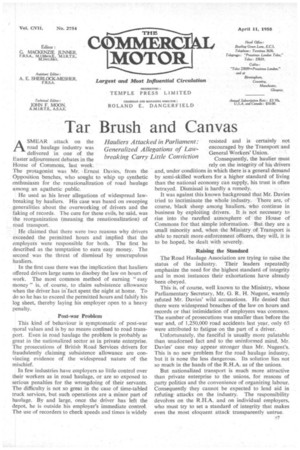Tar. Brush and Canvas A SMEAR attack on the road haulage
Page 41

If you've noticed an error in this article please click here to report it so we can fix it.
industry was delivered in one of the Easter adjournment debates in the House of Commons, = last week. The protagonist was Mr. Ernest Davies, from the Opposition benches, who sought to whip up synthetic enthusiasm for the renationalization of road haulage among an apathetic public.
He used as his lever allegations of widespread lawbreaking by hauliers. His case was based on sweeping generalities about the overworking of drivers and the faking of records. The cure for these evils, he said, was the reorganization (meaning the renationalization) of road transport.
He claimed that there were two reasons why drivers exceeded the permitted hours and implied that the employers were responsible for both. The first he described as the temptation to earn easy money. The second was the threat of dismissal by unscrupulous hauliers.
In the first case there was the implication that hauliers offered drivers large sums to disobey the law on hours of work. The most common method of earning "easy money" is, of course, to claim subsistence allowance when the driver has idfact spent the night at home. To do so he has to exceed the permitted hours and falsify his log sheet, thereby laying his employer open to a heavy penalty.
Post-war Problem This kind of behaviour is symptomatic of post-war moral values and is by no means confined to road transport. Even in road haulage the problem is probably as great in the nationalized sector as in private enterprise. The prosecutions of 13ritish Road Services drivers for fraudulently claiming subsistence allowance are convincing evidence of the widespread nature of the mischief.
In few industries have employers so little control over their workers as in road haulage, or are so exposed to serious penalties for the wrongdoing of their servants. The difficulty is not so great in the case of time-tabled truck services, but such operations are a minor part of haulage. By and large, once the driver has left the depot, he is outside his employer's immediate control. The use of recorders to check speeds and times is widely resisted and is certainly not encouraged by the Transport and General Workers' Union.
Consequently, the haulier must rely on. the integrity of his drivers and, under conditions in which there is a general demand by semi-skilled workers for a higher standard of living than the national economy can supply, his trust is often betrayed. Dismissal is hardly a remedy.
It was against this known background that Mr. Davies tried to incriminate the whole industry. There are, of course, black sheep among hauliers, who continue in business by exploiting drivers. It is not necessary to rise into the rarefied atmosphere of the House of Commons for that simple information. But.they are a small minority and, when. the Ministry • ofTransport is able to recruit more-enforcement officers, they will, it is to be hoped,. be dealt with severely.
Raising the Standard The Road Haulage Association are trying to raise the status of the industry. Their leaders repeatedly emphasize the need for the highest standard of integrity and in most instances their exhortations have already been obeyed.
This is, of course, well known to the Ministry, whose Parliamentary Secretary, Mr. G. R. H. Nugent, warmly refuted Mr. Davies' wild accusations. He denied that there were widespread breaches of the law on hours and records or that intimidation of employees was common. The number of prosecutions was smaller than before the war and, of 1,250,000 road accidents last year, only 65 were attributed to fatigue on the part of a driver.
Unfortunately, the fanciful is usually more palatable than unadorned fact and to the uninformed mind, Mr. Davies' case may appear stronger than Mr. Nugent's. This is no new problem for the road haulage industry, but it is none the less dangerous. Its solution lies not so much in the hands of the R.H.A. as of the unions.
But nationalized transport is much more attractive than private enterprise to the unions, for reasons of party politics and the convenience of organizing labour. Consequently they cannot be expected to lend aid in refuting attacks on the industry. The responsibility devolves on the R.H.A. and on individual employers, who must try to set a standard of integrity that makes even the most eloquent attack transparently untrue.




















































































































